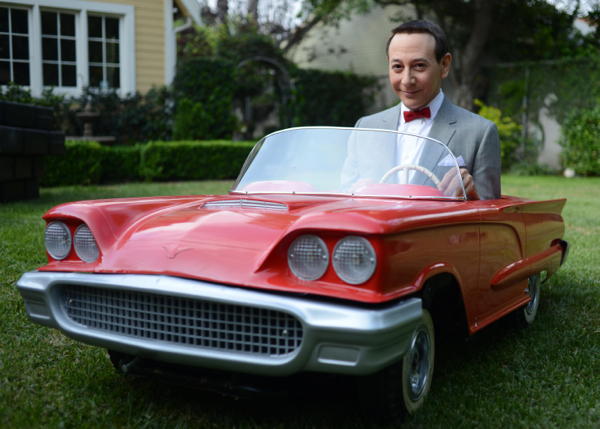Movie review by Greg Carlson
At 63 years of age, Paul Reubens completes a minor miracle with the return of beloved, iconic manchild Pee-wee Herman, the eccentric creation whose appeal to grown-ups and children hit the bullseye in Tim Burton’s feature directorial debut “Pee-wee’s Big Adventure” and on television in “Pee-wee’s Playhouse.” “Pee-wee’s Big Holiday” fails to top the 1980s incarnation of the character, but longtime fans will smile at several of the movie’s colorful gags. Produced by Reubens and Judd Apatow and directed by John Lee, the film is a nostalgic reminder of the anarchic charms of the devilishly singular Herman. The movie could end up pointing some viewers to the early, harder-to-find content showcasing Reubens’ huge talent. It’s unreal that Pee-wee debuted more than 35 years ago.
The screenplay, written by Reubens and Paul Rust, conservatively retraces much of the basic road trip narrative that propelled “Pee-wee’s Big Adventure,” but without the deeply motivating homage to De Sica’s “Bicycle Thieves.” This time, Pee-wee slings hash and mixes milkshakes at Dan’s Diner in the picture postcard town of Fairville, until a chance encounter with Joe Manganiello (playing himself) develops into a star-crossed friendship. Invited to the “Magic Mike” star’s NYC birthday party, Pee-wee lights out cross country, encountering another parade of unusual and idiosyncratic personalities. Perhaps the most welcome cameo comes courtesy of Diane Salinger (so memorable as Francophile dreamer Simone in “Pee-wee’s Big Adventure”). Salinger appears in a brief scene as a fearless aviator who takes Pee-wee in her flying car.
Depictions of the Amish community and flamboyant hairdressers don’t feel particularly progressive, and in one scene the movie plays with the ancient “farmer’s daughters” joke, placing Pee-wee in the path of a nonet of enthusiastic young women. In Rebecca Keegan’s Los Angeles Times review, the critic writes, “…it’s not entirely clear who is meant to be the butt of the joke, as when a farmer with a house full of chubby daughters tries to marry one off to Pee-wee. The moment feels strangely mean-spirited, as if the joke is on unappealing fat women instead of Pee-wee’s ‘Ew! Girls!’ response.” I did not read the film’s presentation of the physicality of the women as mean or negative, but Keegan’s comments speak to the challenges of cultivating subtlety and complexity when viewer response is so subjective.
A significant part of Pee-wee’s enduring appeal manifests in the carefully calibrated subversiveness that allows glimpses of sexuality, selfishness, and anti-authoritarianism alongside a genuine inclusivity and egalitarianism that welcomes and celebrates difference. For me, once a Pee-wee fan, always a Pee-wee fan. I probably won’t watch “Big Holiday” the way I mainlined “Big Adventure,” which saw several VHS copies spool through the deck so many times they fell apart. Still, I loved much about the new odyssey: Pee-wee’s sustained boy soprano scream, pitched a couple octaves above middle C; the exquisitely timed deflating balloon demonstration; the visual homage to the heroines of “Faster, Pussycat! Kill! Kill!” Sometimes, you should just loosen your red bowtie, slip off your glen plaid jacket and white tassel loafers, kick back, relax, and sip from your tiny root beer barrel.
